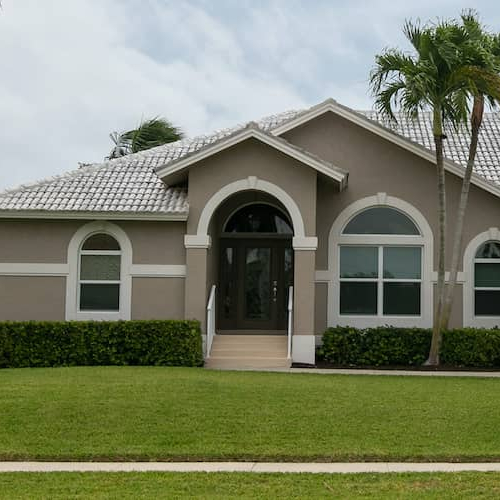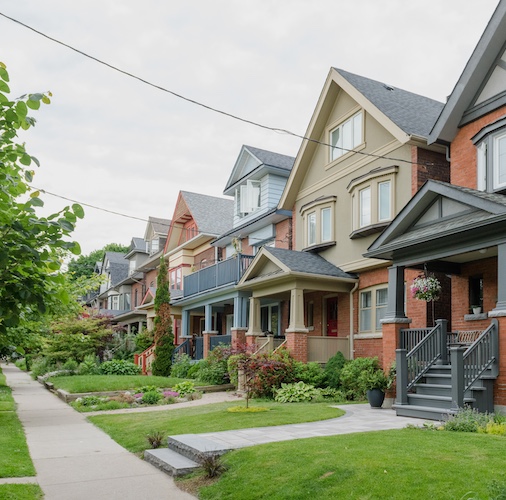What is a nontraditional mortgage?
Contributed by Sarah Henseler
Dec 3, 2025
•8-minute read

A mortgage is a loan secured by your home, but not all mortgages are the same. They come in many flavors. Which is why it’s so weird that legally, anything that’s not a 30-year fixed home loan is considered a nontraditional mortgage. This article is intended to give you an overview of the topic.
While it’s unlikely most would think of a 20-year term as an unconventional mortgage loan, almost anything can be considered nontraditional. Some loans that people typically think of as nontraditional, like non-qualified mortgages, are underwritten very differently and lenders may also have private mortgage options.
What is the SAFE Act?
The Secure and Fair Enforcement for Mortgage Licensing Act (SAFE Act) – otherwise known as Regulations G and H – establishes minimum federal standards for those looking to become licensed mortgage loan originators. There are several requirements, including the following:
- Demonstration of good financial character (often established through a credit check)
- No felony convictions involving fraud, dishonesty, breach of trust, or money laundering
- No felonies of any kind in the 7 years prior to application
- 20 hours of prelicensing education with 8 hours of continuing education annually
- A score of at least 75% on a test created by the Nationwide Mortgage Licensing System and Registry (commonly referred to as the SAFE test)
While the act is focused on making sure the people who originate your mortgage are qualified appropriately, they take the time to define a nontraditional mortgage.
What is a traditional mortgage loan?
If you’re going to take the time to define nontraditional mortgage, you would think they would take the time to define what’s traditional, but it’s only defined by implication.
Under the SAFE Act’s education requirements, a nontraditional mortgage product is defined as anything that’s not a 30-year fixed-rate loan. That means the 30-year fixed is the traditional mortgage loan under the act. Think of it as the vanilla of mortgages.
The 30-year fixed has its virtues. It’s the way to go for many people who want the lowest possible monthly payment. But it is somewhat confusing to think of any other option as nontraditional.
Types of nontraditional mortgages
If we accept the premise that anything other than that 30-year fixed is a nontraditional mortgage, it’s useful to do some further defining of nontraditional by breaking things into classes:
The first class are loans that are qualified in a traditional manner based on a lender’s full analysis of several factors, including your credit history and outstanding debts, along with not having certain features deemed exotic under the safe harbor and rebuttable presumption section of the Dodd-Frank Act of 2010.
There are whole bunch of qualified mortgage rules worth knowing if you plan on becoming a mortgage loan originator. For the rest of us, the way to think of this is that if the only feature of your loan that makes it “nontraditional” is the term or having an adjustable rate, it belongs in the first class.
The second class of loans are called nonqualified mortgages. We’ll get into these later on, but the structure of these loans is much more in line with what a member of the public would probably consider a nontraditional mortgage.
Let’s go a little deeper on each of these categories.
Conventional and government nontraditional mortgages
Conventional and government loans that aren’t a 30-year fixed are considered nontraditional, but they’re actually very commonplace. The different term lengths and the chance to pick the rate structure give you the control to pick something that’s ideal for your personal situation.
In addition to the 30-year fixed, Rocket Mortgage offers the custom-term YOURgage®, a conventional fixed-rate loan allowing you to pick any term of 8 – 29 years. Longer terms mean lower monthly payments. You save on interest by taking a shorter-term.
An adjustable-rate mortgage allows you to take advantage of a lower-than-market fixed-rate for the first part of the loan. It adjusts upon the expiration of the fixed period at regular intervals based on an index added to a margin. The magnitude of each adjustment is subject to caps and floors.
What is a nonconforming loan?
A nonconforming loan is any loan that doesn’t meet the investment standards of Fannie Mae and Freddie Mac. These agencies buy loans from lenders and package them into mortgage-backed securities to be sold on the bond market. This gives lenders the liquidity they need to make more loans.
Conventional loans are just loans made by private lenders. All conforming loans are conventional, but not all conventional loans are conforming.
Nonconforming loans often come with more flexible credit standards or allow you to qualify with higher levels of preexisting debt. Some examples of loans that are considered nonconforming include such staples as FHA and VA loans.
When is a nontraditional loan also a nonconforming loan?
Because nontraditional loans comprise anything that’s not a 30-year fixed, plenty of common nontraditional loans are also nonconforming. Think FHA and VA loans that are 15 or 20 years in length.
While some nontraditional loans have more exotic and risky terms, it’s important to note that many are just loans that aren’t 30 years and not backed by Fannie Mae or Freddie Mac. When choosing a mortgage lender, pay attention to what they offer you as well as their reputation so you can decide if an option makes sense for you.
What is a nonqualified mortgage?
When most people think of nontraditional loans, they’re thinking of nonqualified mortgages. In contrast to qualified mortgages, these tend you have unique features like a balloon or interest-only payments. They can be a great option for a borrower in the right situation, but you also need to know what you’re getting into.
Nonqualified mortgages may have more flexible requirements for credit score and debt-to-income ratio (DTI), but they can be risky for both lenders and borrowers.
Types of nonqualified mortgages
There are several types of nonqualified mortgages that are available. We’re going to touch on several:
Bank statement loans
Bank statement loans allow you to qualify using cash flow rather than the amount of money declared on your taxes. This can be particularly helpful for self-employed borrowers who don’t show much taxable income due to having so many potential business-related deductions.
Lenders like to see that you’re separating your business and personal funds, paying yourself a salary from the business. If you plan on qualifying with personal accounts, you can do it with as little as 25% ownership in the business. Mix business and personal funds? Rocket Mortgage® will look at your business funds if you own 50%.
Balloon mortgages
A balloon loan is a mortgage that uses a lump-sum payment schedule. This means that at the end of the loan, you’ll have to pay the remainder of the balance all at once. This can happen in one of two ways:
- Your lender asks you to pay only the interest accrued during the life of the loan, then you pay the principal at the end.
- You pay the interest and principal during the life of the loan, then the remaining balance at the end.
An example of a balloon loan is a bridge loan. You might use one of these to gain the funds for a down payment on a new house before selling your current one.
Interest-only loans
An interest-only mortgage is similar to a balloon loan. Some interest-only loans allow borrowers to make interest-only payments rather than interest and principal. Unlike a balloon loan, however, interest-only mortgages allow you to pay just the interest for a set number of years. After that, your balance begins to amortize, which increases your monthly payment.
Some interest-only loans are adjustable-rate mortgages (ARMs), meaning your interest rate on the loan will be adjusted several times each year based on the current rates, causing your monthly payments to go up or down. ARMs can be more expensive long term, so you may want to refinance to a conventional fixed-rate loan.
Rocket Mortgage offers a 40-year mortgage with a fixed-rate where the first 10 years only require interest payments. After that, the loan is fully amortizing over the next 30 years.
Debt service coverage ratio (DSCR)
Debt service coverage ratio loans (DSCR) qualify clients for mortgage payments based on the amount of rental income brought in by an investment property. This is in contrast to more traditional qualification like credit, assets, and income.
Payment-option ARM
A payment-option ARM adjusts monthly and allows borrowers to decide how they want to pay down the loan. Borrowers are given several payment and term options to choose from, including 15-year and 30-year amortizing payments, minimum payments that don’t cover interest, and interest-only payments. Rocket Mortgage does not offer option ARMs.
Pros and cons of nontraditional mortgages
Nontraditional mortgages have a reputation for being riskier, but they can also be very useful to borrowers, depending on their situation. Let’s review some of the pros and cons.
Pros
- A wider variety of payment options: You cannot only choose your term, but also whether your interest rate is fixed or adjustable. If you’re savvy you may be able to save on interest over time this way.
- Ability to save or invest money elsewhere: If you go with an ARM or interest-only option, your payment may be cheaper for the first several years of the loan enabling you to invest money elsewhere, without having to ask yourself whether you should buy a house while compromising another goal.
- Paying off the loan faster: Choosing a different term allows you to pay off the loan faster so you don’t have a monthly house payment. Alternatively, you can accomplish the effect by putting more toward the balance and paying off your mortgage early.
Cons
- Interest rates may be higher: This isn’t the case with all nontraditional mortgages, but interest rates may be higher with nonqualified mortgages due to increased hazard of default.
- May be riskier for borrowers: Some nontraditional mortgage features can increase the risk of payment changes that may lead to financial strain for some. There’s always the chance for someone to go into mortgage default due to payment shock.
- Vulnerability to market changes: Market changes can have a big impact because many nontraditional mortgages that are ARMs will have the rates fluctuate based on market swings after an initial fixed-rate period.
- Equity may build slower: The amount of home equity you earn by making each mortgage payment may build more slowly if you have certain payment features like a period of interest-only payments. If you have an option ARM, you may not build equity at all during the period when you have the option if you choose to make a minimum payment that doesn’t cover the interest. You can actually end up with negative amortization, owing more money over time.
Are nontraditional mortgages a good idea?
As we’ve mentioned, nontraditional mortgages could mean unique payment features, but it could also refer to any loan without a fixed rate lasting 30 years. When it covers such a wide gamut of options, there’s not a single piece of advice that’s going to apply to your decision-making.
As with any mortgage, the best thing to do is take a look at your financial situation to determine what you’re comfortable with. A Home Loan Expert will be able to work with you to help make the best decision.
The bottom line: Explore all your options
Defined as any home loan that doesn’t have a 30-year term with a fixed-rate, the category of nontraditional mortgage is much bigger than most people think. In fact, it encompasses what most people would think of as traditional options like conventional, FHA, and VA loans.
When referring to “nontraditional” options, most people think of nonqualified mortgages with features like interest-only payments, bank statement loan qualification, and the like. These can be good options for someone in the right situation.
Again, the right mortgage for you is going to be based on your individual situation. Ready to check out your options? Get the process started by applying online.
This article is for informational purposes only, and is not a substitute for professional advice from a medical provider, licensed attorney, financial advisor, or tax professional. Consumers should independently verify any service mentioned will meet their needs.
Kevin Graham
Kevin Graham is a Senior Writer for Rocket. He specializes in mortgage qualification, economics and personal finance topics. Kevin has passed the MLO SAFE exam given to mortgage bankers and takes continuing education courses. As someone with cerebral palsy spastic quadriplegia that requires the use of a wheelchair, he also takes on articles around modifying your home for physical challenges and smart home tech. He has a BA in Journalism from Oakland University.
Related resources

8-minute read
7 ways to refinance if you have ‘bad’ credit
If you’re looking to refinance, you’ll typically need to meet credit requirements. But it’s still possible to refinance with bad credit.
Read more

8-minute read
Different types of mortgages and how they work
There is a home loan for everyone, but which type of mortgage is best for you? Use this article to understand the types of home loans and how they work.
Read more

8-minute read
How to determine if you should buy a house
A lot of factors go into determining whether or not you should buy a house. Here’s what you need to know when making the decision to buy now, or hold o...
Read more